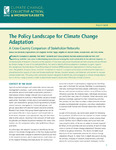The Policy Landscape for Climate Change Adaptation A Cross-Country Comparison of Stakeholder Networks
| dc.contributor.author | Aberman, Noora-Lisa | |
| dc.contributor.author | Birner, Regina | |
| dc.contributor.author | Haglund, Eric | |
| dc.contributor.author | Ngigi, Marther W. | |
| dc.contributor.author | Ali, Snigdha | |
| dc.contributor.author | Okoba, Barrack | |
| dc.contributor.author | Koné, Daouda | |
| dc.contributor.author | Alemu, Tekie | |
| dc.date.accessioned | 2019-09-18T10:50:21Z | |
| dc.date.available | 2019-09-18T10:50:21Z | |
| dc.date.issued | 2015 | |
| dc.identifier.uri | http://ir.mksu.ac.ke/handle/123456780/4820 | |
| dc.description.abstract | An increasing body of research is focusing on the question of how poor agricultural households will both perceive and be affected by climate change. In view of its predicted effects, the need to identify effective adaptation strategies is urgent. Against this background, the International Food Policy Research Institute (IFPRI) and partner organizations in the four study countries—Bangladesh, Ethiopia, Kenya, and Mali—embarked on research to support policymakers and development agencies in strengthening the capacity of male and female smallholder farmers, livestock keepers, and fishermen and women to manage climate-related risks. This policy note summarizes research designed to identify key actors engaging in climate change adaptation in the four study countries in order to disseminate research results more effectively in those countries. | en_US |
| dc.language.iso | en_US | en_US |
| dc.title | The Policy Landscape for Climate Change Adaptation A Cross-Country Comparison of Stakeholder Networks | en_US |
| dc.type | Article | en_US |
Files in this item
This item appears in the following Collection(s)
-
School of Agricultural Sciences [118]
Sholary Articles by Faculty & Students in School of Agricultural Sciences

